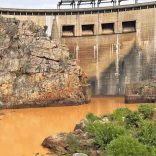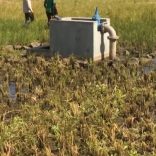Mozambique: Pollution forces fishermen to stop fishing in Manica - AIM report
Mozambique: Government launches project to improve crop management

Photo: AIM
The Mozambican government has launched an agricultural project aimed at improving the country’s food system and strengthening soil fertility and crops management.
The project, named “Soil Mapping for Resilient Agri-Food Systems, Vision for Crops and Adapted Soils (SoiLFER-VACS)”, was launched on Tuesday, in Maputo, in partnership with the Japanese government and the United Nations Food and Agriculture Organization (FAO). The Japanese government will disburse 2 million dollars for the project implementation.
🚀 Launch of the SoilFER–VACS Project in 🇲🇿 #Mozambique! 📅 10–11 June 2025 |🌱 Enhancing soil data systems & digital tools for smallholder farmers
🔗 https://t.co/cFe58fU1uH#SoilFER #SoilHealth pic.twitter.com/KLPHTslbAY— FAO Land, Soil and Water (@FAOLandWater) June 10, 2025
According to Acubar Baptista, permanent secretary of the Ministry of Agriculture, soil health is important to ensure the sustainable intensification of agriculture. This project, he said, “is particularly important for the country, at a time when the Ministry of Agriculture is challenged to improve the food system in order to guarantee an increase in agricultural production and productivity.”
Baptista explained that the country lacks systematized information in order to make appropriate decisions that contribute to the efficient use of soils for agricultural production.
“We hope that the soil survey proposed in the project will identify limitations and make recommendations on the suitability of soils for strategic crops and, in this way, contribute to increasing agricultural production”, he said.
According to Baptista, equipping the soil laboratory at the country’s Agricultural Research Institute (IIAM) and strengthening the technical capacity of laboratory staff will be a priority.
“Improving the analysis capacity of IIAM’s central soil laboratory is fundamental as it will provide information on the most appropriate soil management, such as the type of fertilizers, correctives and the amount to be applied, which will prevent environmental degradation and unnecessary expenditure due to excessive fertilizer application”, he said.
On the other hand, with the introduction of soil analysis tools, analysis time will be reduced and information can be passed on to producers as quickly as possible.
For his part, the Japanese ambassador, Hamada Keiji, said the project will be crucial for the country since 80 percent of the active population in Mozambique works in agriculture and 96 percent of farmers are in rural areas.
“Agriculture is important for Mozambique to increase productivity and create jobs, thus increasing incomes in rural areas, which is expected to contribute to poverty reduction and improve food security,” he said.












Leave a Reply
Be the First to Comment!
You must be logged in to post a comment.
You must be logged in to post a comment.